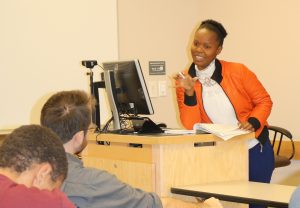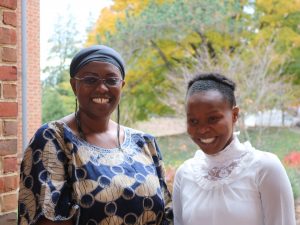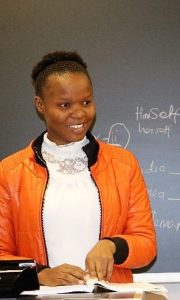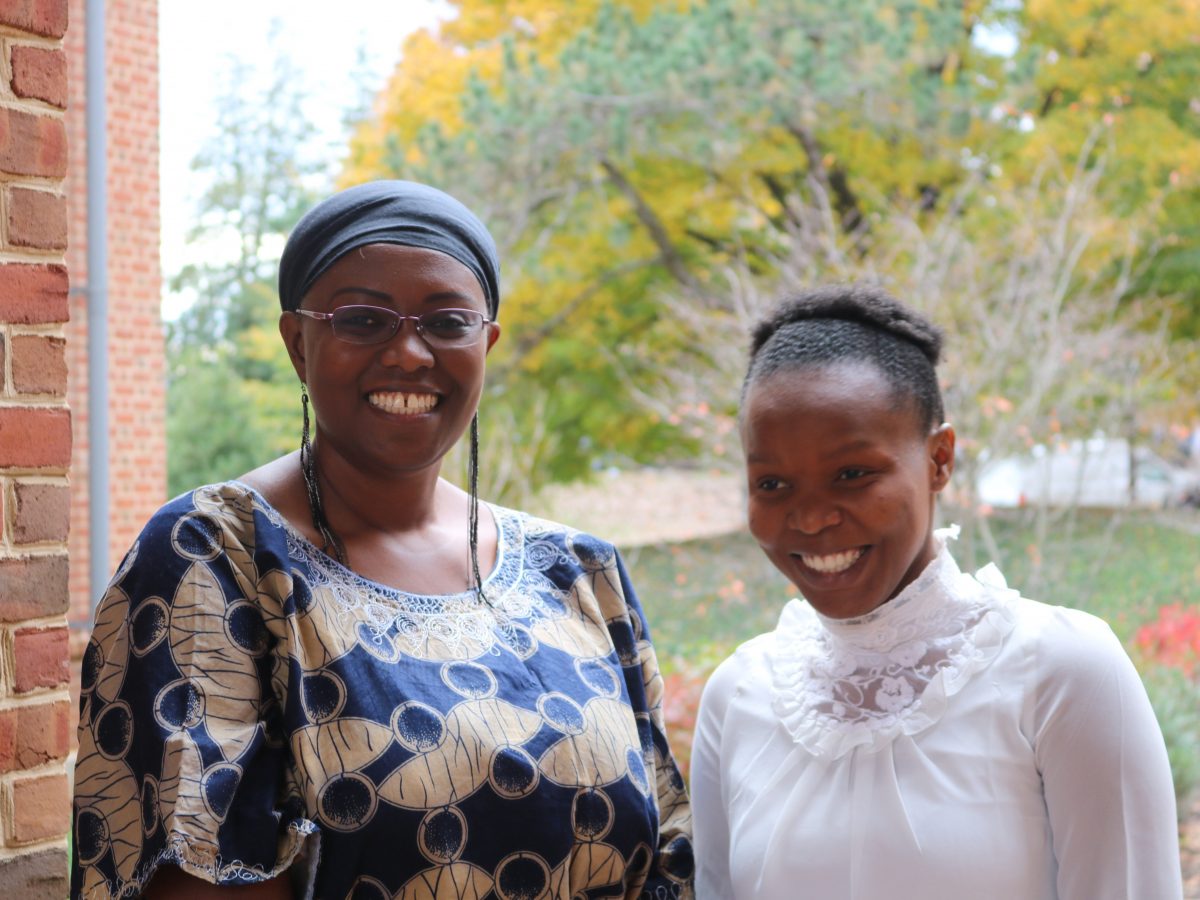In August 2018, the Swahili language program in the Department of African American and African studies welcomed Edith Mwevezi Kachia as a Fulbright Foreign Language Teaching Assistant for the 2018-19 academic year.

Kachia, a native of Kenya, brings a wealth of cultural insights, linguistic knowledge, and enthusiasm to her new life on grounds.
Kachia currently teaches beginning Swahili language under the direction of Anne Rotich, Assistant Professor of African American and African Studies, who spearheaded the effort to bring an FLTA to the UVA Swahili program. Alongside teaching, she leads Swahili conversation tables, and has developed cultural events related to Swahili cultures, including a Swahili film night near the end of the semester.
It Took a Village
Rotich, who also heads the UVA Swahili program, worked throughout Spring 2018 to request a Swahili-speaking assistant via the Fulbright FLTA program. The

FLTA program, a long-standing initiative of the US Department of State, places international teaching assistants at hundreds of US universities annually. With the support of The Carter G. Woodson Institute for African American & African Studies’ Director, Deborah McDowell, and Associate Dean Francesca Fiorani, Rotich submitted a successful application in Spring 2018. Kachia is only the second FLTA to be placed at UVA (the first was an Urdu language FLTA, in 2013).
Of the Fulbright FLTA application process, Rotich says “Arranging for Edith to come to UVA took a whole village, to plan and ultimately bring her here!” That village–from Carter Woodson, the International Studies Office, and other partners across grounds–have supported Kachia in getting set up with office space, locating housing, and settling in to Charlottesville. Though the application and supervisory responsibilities are considerable, the benefits outweigh the costs, and Rotich is considering seeking FLTA support in the future.
Expanding Opportunities for Meaningful Learning
The opportunity for increased interaction with a native speaking educator—particularly of a less-commonly taught language such as Swahili—is a key benefit of the FLTA program. FLTA participants hold degrees in English, Education, and related fields, and often have significant work experience as educators. For students of languages with relatively few textbooks and resources, having a trained instructor to learn from can make a major difference. With Kachia’s presence, the Swahili program is able to both deepen student learning, through increased language contact, and expand it, by introducing more students to Swahili cultures across grounds. Kachia recently gave presented on contemporary Kenyan music in Rotich’s Swahili Cultures course—a course that might not have been offered without Kachia’s addition to the teaching team.
Kachia is especially interested in creating discussion around cultural perspectives and practices, and often brings up cultural issues in class. As an example of a cultural perspective that may be new to UVA students, she notes that she refers to her father’s brother not as “uncle” but as “baba” (“father”) because “For us, you understand that you are a child of your community, not just of your parents.” Introducing such perspectives, and asking students to engage with them, allows Kachia to create space for deeper intercultural understanding and communication.
Studying at UVA: New Courses and Opportunities
Kachia’s teaching and learning experiences in the US extend well beyond her Swahili classroom, as she adjusts to life in Charlottesville and to being both an instructor and a student in the US educational system. Fulbright FLTAs joining US universities are required to enroll in two university courses per semester, so Kachia opted for one course in Women’s Literature, and another in Black Queer Culture. “Black queer culture is a course that is not taught back in Kenya, because it is controversial. Therefore, I wanted to learn more,” she says. With a smile she recalls a meaningful experience in the course, when Professor Timothy Griffiths asked students to consider the song that described them best. “Immediately, a song started in my mind: Girl Power by Cheetah Girls!”
Fulbright FLTAs joining US universities are required to enroll in two university courses per semester, so Kachia opted for one course in Women’s Literature, and another in Black Queer Culture. “Black queer culture is a course that is not taught back in Kenya, because it is controversial. Therefore, I wanted to learn more,” she says. With a smile she recalls a meaningful experience in the course, when Professor Timothy Griffiths asked students to consider the song that described them best. “Immediately, a song started in my mind: Girl Power by Cheetah Girls!”
Eager to get the most of her time at UVA, Kachia says “During my year at UVA, I am looking forward to learning and participating in many American cultural experiences and opportunities that may come my way. I look forward to sharing cultural experiences with my Swahili students, meeting new friends, learning more about things that I love, and trying new things.”
–Hope Fitzgerald, Language Commons

